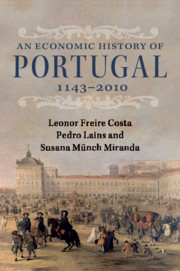Book contents
- Frontmatter
- Contents
- List of figures
- List of maps
- List of tables
- Preface
- Introduction
- 1 The medieval economy, 1143–1500
- 2 The age of globalization, 1500–1620
- 3 War and recovery, 1620–1703
- 4 The Atlantic economy, 1703–1807
- 5 The rise of liberalism, 1807–1914
- 6 Patterns of convergence, 1914–2010
- Conclusion
- References
- Index
Conclusion
Published online by Cambridge University Press: 05 May 2016
- Frontmatter
- Contents
- List of figures
- List of maps
- List of tables
- Preface
- Introduction
- 1 The medieval economy, 1143–1500
- 2 The age of globalization, 1500–1620
- 3 War and recovery, 1620–1703
- 4 The Atlantic economy, 1703–1807
- 5 The rise of liberalism, 1807–1914
- 6 Patterns of convergence, 1914–2010
- Conclusion
- References
- Index
Summary
This book is about the economic history of a small country at the southwestern European periphery, with borders dating back to the twelfth century, and which was for a long period of time at the center of an empire with settlements across Asia, South America, and Africa. The study is based on a large body of literature which has focused on the evolution of political, institutional, demographic, and economic settings within a long period of state formation and consolidation. In spite of the scarcity of quantitative information, most of all regarding the medieval and early modern periods, we were able to provide a coherent account that responds to the fundamental questions about when, how, and why the economy expanded, stagnated, or contracted, and about changes of the country's role in the world economy. All countries matter in a way or another, but Portugal, the country we have studied here, matters in many ways that are particularly relevant. European economic history is also about what happened in its peripheral regions.
It is our contention that the present study highlights in a relevant way the vagaries of long-term institutional and economic development in the European periphery. Our research shed light on the reasons why empires are formed and the economic consequences they may have in the metropolitan economies, as well as on the role of economic and financial transactions at international level, and movements of population and urbanization. The book is also relevant for understanding the degree to which political stability influenced the pace of economic growth.
With fixed borders for more than eight centuries, Portugal provides a case study for which we can observe several dimensions considering the steadiness of space and political order. Since late medieval times, Portugal seldom experienced warfare in its domestic front, at a time when international relations in Europe were shaped by military confrontations that are at the root of state formation. Even the Dynastic Union of 1580 was not the fruit of conquest, but an enforcement of the rights of Philip II of Spain to the throne of Portugal. The secession in 1640, however, became a milestone in the political history of the country.
- Type
- Chapter
- Information
- An Economic History of Portugal, 1143–2010 , pp. 345 - 352Publisher: Cambridge University PressPrint publication year: 2016



